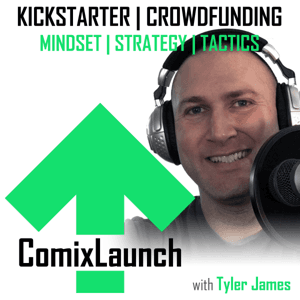This week, we welcome the brilliant Dylan Meconis, creator of Queen of the Sea and Bite Me.
How most colorists actually break in (hint: it’s not by “murdering another colorist in single combat” — though that was discussed)
What “flatting” is — and why it’s often your first step into paid coloring work
Why networking is really just “being friends with cartoonists”
Portfolio strategy: Why saying “I do everything” is less effective than saying “I do this brilliantly”
Analog coloring techniques — watercolor paper, oil-based pencils, and why certain materials go extinct at the worst possible moment
The realities of scanning physical art (and why scanners are basically cameras on an arm)
How to handle black plates, rich black, and avoiding fuzzy type in print
If you’ve ever wondered whether coloring could be an income stream for you — or how to level up your current process — this episode is a masterclass.Products and Programs mentioned on the show
Note: Some of the links are affiliate links
WildCraft Studio is in Portland, Oregon.
PITT monochrome oil pencils by Faber-Castell
Watercolor paints, Daniel Smith brand
Watercolor paper (cold press) by Arches
White watercolor paper, Dick Blick house brand
Epson scanner, Perfection series
Epson scanner, Workforce series
Colored pencils, Caran d'AcheIn this engaging conversation, the hosts welcome cartoonist Dylan Meconis to explore various topics including coloring techniques, the integration of digital and traditional media, and the importance of choosing the right materials for comic creation. Dylan shares insights into her unique artistic process, the challenges of color printing, and the significance of lettering in comics. The discussion also highlights the value of collaboration and the joy of discovering new art supplies.
Dylan Meconis emphasizes the importance of using various mediums in art.
The process of creating 'Queen of the Sea' involved unique coloring techniques.
Dylan's artistic process includes both traditional and digital methods.
Choosing the right materials can significantly impact the final artwork.
Scanners play a crucial role in capturing traditional art for digital use.
Lettering is an essential aspect of comic creation that requires careful consideration.
Collaboration with other artists can enhance the creative process.
Experimenting with different art supplies can lead to unexpected discoveries.
Understanding color printing challenges is vital for comic artists.
Dylan's approach to art is influenced by her background and experiences.You get great rewards when you join the ComicLab Community on Patreon
- $2 — Early access to episodes
- $5 — Submit a question for possible use on the show AND get the exclusive ProTips podcast. Plus $2-tier rewards.
If you'd like a one-on-one consultation about your comic, book it now!
Brad Guigar is the creator of Evil Inc and the author of The Webcomics Handbook. He is available for personal consultations. Dave Kellett is the creator of Sheldon and Drive. He is the co-director of the comics documentary, Stripped.




































